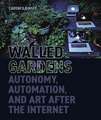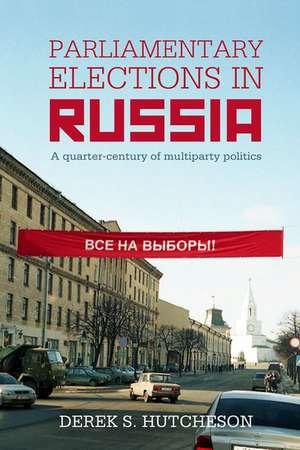Parliamentary Elections in Russia: A Quarter-Century of Multiparty Politics: British Academy Monographs
Autor Derek S. Hutchesonen Limba Engleză Hardback – 5 apr 2018
Din seria British Academy Monographs
- 27%
 Preț: 471.54 lei
Preț: 471.54 lei - 25%
 Preț: 124.89 lei
Preț: 124.89 lei - 27%
 Preț: 501.53 lei
Preț: 501.53 lei - 22%
 Preț: 188.18 lei
Preț: 188.18 lei - 19%
 Preț: 678.05 lei
Preț: 678.05 lei - 28%
 Preț: 433.04 lei
Preț: 433.04 lei - 19%
 Preț: 627.73 lei
Preț: 627.73 lei - 27%
 Preț: 347.43 lei
Preț: 347.43 lei - 30%
 Preț: 648.07 lei
Preț: 648.07 lei - 30%
 Preț: 652.70 lei
Preț: 652.70 lei - 19%
 Preț: 505.45 lei
Preț: 505.45 lei - 17%
 Preț: 543.30 lei
Preț: 543.30 lei - 30%
 Preț: 543.97 lei
Preț: 543.97 lei - 30%
 Preț: 541.61 lei
Preț: 541.61 lei - 30%
 Preț: 515.91 lei
Preț: 515.91 lei - 18%
 Preț: 321.69 lei
Preț: 321.69 lei - 30%
 Preț: 595.60 lei
Preț: 595.60 lei - 19%
 Preț: 589.20 lei
Preț: 589.20 lei - 19%
 Preț: 574.21 lei
Preț: 574.21 lei - 28%
 Preț: 376.01 lei
Preț: 376.01 lei - 28%
 Preț: 438.17 lei
Preț: 438.17 lei - 27%
 Preț: 501.93 lei
Preț: 501.93 lei - 29%
 Preț: 520.79 lei
Preț: 520.79 lei - 28%
 Preț: 469.25 lei
Preț: 469.25 lei - 27%
 Preț: 346.13 lei
Preț: 346.13 lei - 30%
 Preț: 544.80 lei
Preț: 544.80 lei - 31%
 Preț: 346.67 lei
Preț: 346.67 lei - 31%
 Preț: 468.15 lei
Preț: 468.15 lei - 28%
 Preț: 435.50 lei
Preț: 435.50 lei - 30%
 Preț: 602.11 lei
Preț: 602.11 lei - 30%
 Preț: 858.98 lei
Preț: 858.98 lei
Preț: 411.05 lei
Preț vechi: 563.81 lei
-27% Nou
Puncte Express: 617
Preț estimativ în valută:
78.66€ • 84.11$ • 65.58£
78.66€ • 84.11$ • 65.58£
Carte disponibilă
Livrare economică 17-24 martie
Preluare comenzi: 021 569.72.76
Specificații
ISBN-13: 9780197266281
ISBN-10: 0197266282
Pagini: 356
Ilustrații: 6 black and white half tone illustrations
Dimensiuni: 164 x 242 x 27 mm
Greutate: 0.71 kg
Editura: OUP OXFORD
Colecția OUP Oxford
Seria British Academy Monographs
Locul publicării:Oxford, United Kingdom
ISBN-10: 0197266282
Pagini: 356
Ilustrații: 6 black and white half tone illustrations
Dimensiuni: 164 x 242 x 27 mm
Greutate: 0.71 kg
Editura: OUP OXFORD
Colecția OUP Oxford
Seria British Academy Monographs
Locul publicării:Oxford, United Kingdom
Recenzii
Hutcheson is clearly well-versed in theoretical work about electoral authoritarianism and about legislatures in more democratic systems. But the strengths of this volume lie not in any kind of theoretical contributions but more in the historical detail of how one particular legislative system became increasingly less competitive. For scholars interested in that story, Parliamentary Elections in Russia is a gold mine.
Overall, the book "Parliamentary Elections in Russia" represents an important contribution to the debate on the evolution of the electoral system and the role of elections in the Russian political system. In fact, the author inserts the parliamentary elections in a wide-ranging context of political change in Russia from the late 1980s until the present day. Hutcheson's study is a masterful work for the originality of the approach adopted and for the depth and completeness of the analysis.
For such an empirically rich study with its detailed statistical analysis of election results, voter profiles, party strategies and so on, this is a very readable book, one which is clearly based on many years' experience in the field.
The text is peppered with fascinating details...This book will be of interest to scholars of Russian politics, electoral politics, legislative politics and authoritarianism. By virtue of its breadth and depth, it will be a key resource in understanding an important dimension of the construction of the modern-day Russian political system by a scholar with unmatched knowledge of the intricacies of the Russian electoral system.
Overall, the book "Parliamentary Elections in Russia" represents an important contribution to the debate on the evolution of the electoral system and the role of elections in the Russian political system. In fact, the author inserts the parliamentary elections in a wide-ranging context of political change in Russia from the late 1980s until the present day. Hutcheson's study is a masterful work for the originality of the approach adopted and for the depth and completeness of the analysis.
For such an empirically rich study with its detailed statistical analysis of election results, voter profiles, party strategies and so on, this is a very readable book, one which is clearly based on many years' experience in the field.
The text is peppered with fascinating details...This book will be of interest to scholars of Russian politics, electoral politics, legislative politics and authoritarianism. By virtue of its breadth and depth, it will be a key resource in understanding an important dimension of the construction of the modern-day Russian political system by a scholar with unmatched knowledge of the intricacies of the Russian electoral system.
Notă biografică
Derek Hutcheson is Associate Professor of Political Science at Malmö University, Sweden. He has published extensively on electoral politics, particularly of the post-Soviet region, and on the electoral rights of transnational citizens. Prior to working in Sweden, he was head of European Studies at University College Dublin from 2006 to 2013 and an ESRC and British Academy Postdoctoral Fellow at Glasgow University (2002-05). In association with his involvement in the Global Citizenship Observatory (formerly EUDO-Citizenship), he was also invited to spend several months at the European University Institute (EUI) in Florence as an EU Research Fellow in 2016.
